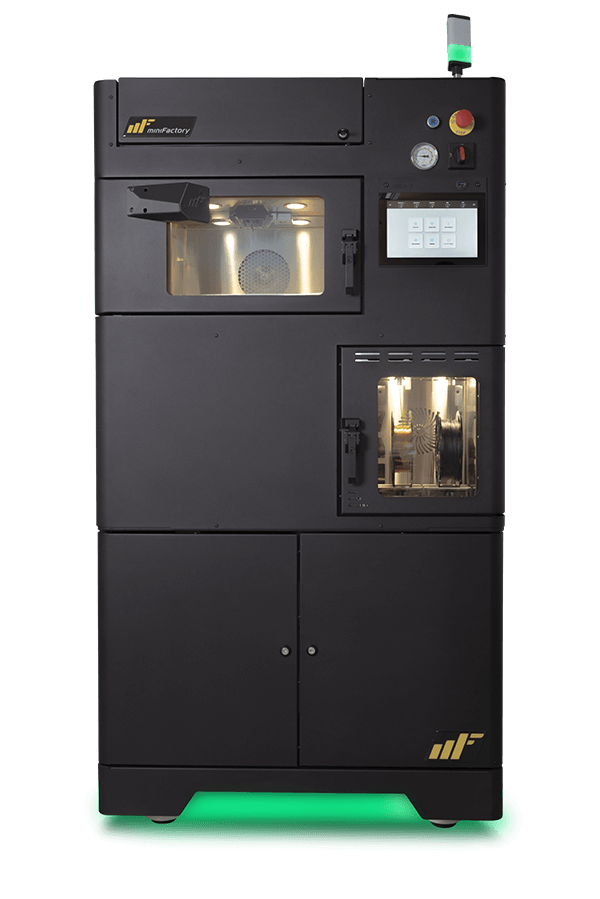A impressão 3D na indústria médica possibilita a produção econômica de caixas e invólucros de esterilização personalizados por meio do uso de materiais específicos para a indústria.
Para melhorar a ergonomia dos profissionais do setor médico, a impressão 3D de polímeros de alto desempenho torna possível a fabricação de ferramentas assistivas específicas para a aplicação. Por exemplo, mecanismos de liberação, trincos ou suportes podem ser fabricados com materiais resistentes a produtos químicos.
Com a impressora 3D miniFactory Ultra, os OEM da indústria médica podem alcançar a flexibilidade no desenvolvimento e na produção com materiais adequados para atender às rigorosas regulamentações do setor.
Com a tecnologia de impressão 3D da miniFactory, até mesmo as aplicações mais desafiadoras da indústria médica podem ser atendidas utilizando ultra polímeros PPSU. O PPSU permite o uso de todas as tecnologias comerciais de esterilização, incluindo gás EtO, radiação, autoclave a vapor e plasma. Com o PPSU, os estojos e invólucros podem ser esterilizados com a mesma tecnologia dos produtos fabricados. Além disso, as peças impressas em 3D podem ser submetidas a ciclos repetitivos de esterilização, tornando-as uma excelente opção para dispositivos médicos reutilizáveis.
A impressão 3D na indústria médica proporciona uma redução significativa de peso e maior liberdade de design em comparação com os metais. Como resultado, os dispositivos médicos podem apresentar geometrias complexas e estruturas leves, com uma produção econômica realizada no local.
O setor médico possui um extenso portfólio de diferentes aplicações e dispositivos. Além disso, os hospitais contam com uma grande diversidade de pessoas, desde funcionários até pacientes, cada um com necessidades e exigências distintas. Isso gera inúmeros cenários e demandas personalizadas para peças e acessórios. Com a impressão 3D na indústria médica, essa demanda pode ser atendida com a liberdade de uma customização em massa econômica. Cada necessidade de acessório ou ferramenta pode ser suprida projetando peças adequadas que podem ser produzidas no local, utilizando materiais padronizados reconhecidos pelo setor médico. Quando os acessórios podem ser adaptados aos usuários e aplicações, a ergonomia do trabalho melhora significativamente, assim como a segurança e a saúde dos funcionários e pacientes.
Os materiais utilizados nessas aplicações precisam resistir a diferentes produtos químicos de limpeza usados frequentemente para manter a higiene. O uso de polímeros de alto desempenho garante alta durabilidade das peças.
A indústria de fabricação de dispositivos médicos é um mercado em constante crescimento e evolução. Muitas vezes, há necessidade de peças personalizadas em pequenos volumes para a fabricação de equipamentos de tratamento, para os quais a impressão 3D é uma excelente solução. Os polímeros de alto desempenho são duráveis, leves e, por exemplo, resistentes a altas temperaturas e produtos químicos agressivos, permitindo sua utilização eficiente na fabricação de equipamentos.
A impressão 3D com miniFactory Industrial 3D Printers pode ser realizada localmente de forma confiável e repetitiva. Além disso, a impressão 3D com polímeros de alto desempenho também possibilita a criação de produtos de suporte para o rápido desenvolvimento de outros dispositivos médicos, como gabaritos de teste, estojos de esterilização ou carcaças protetoras para os equipamentos testados.

Entre em contato e nossos especialistas entrarão em contato em breve.
"*" indica campos obrigatórios